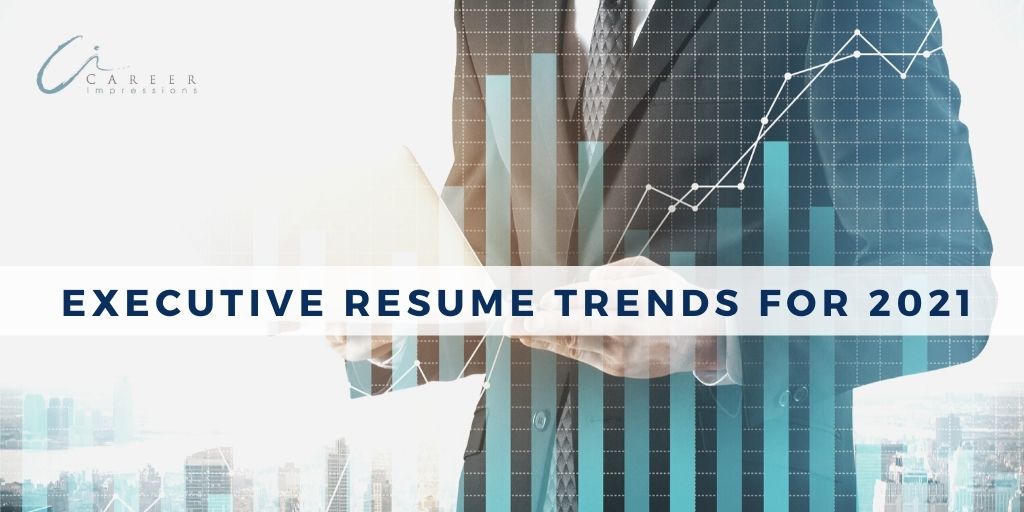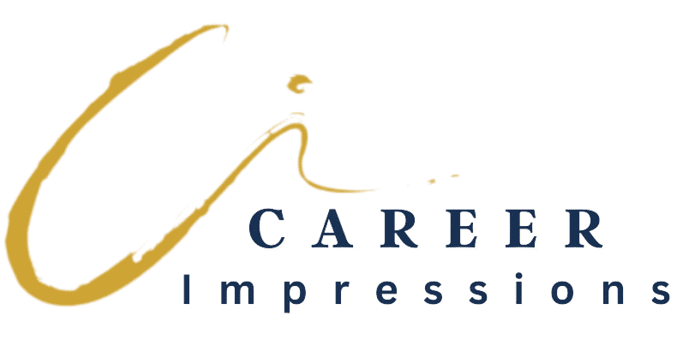
Executive Resume Trends for 2021
What will executive resumes look like in 2021, and what executive resume trends will continue or commence in the year ahead?
The job market in both Canada and the US remains competitive, and it is difficult to say what the economy will do in 2021. Professionals of all levels would be wise to have robust, tailored career tools ready to use in conjunction with savvy search strategies to stand out and secure top jobs.
For executives, the need for a professional, tailored resume remains a vital search tool that requires even more strategy, succinct storytelling, and a strong emphasis on results heading into 2021.
I reached out to my valued community of resume writers and recruiters to ask for professional insights on resume trends and tactics. Four major resume trends rose to the top of the list for 2021, which are summarized below.
View the full conversation on LinkedIn and benefit from a copious amount of resume tips and trends to consider as you move into the new year.

Executive Resume Trend 2021: Spotlighting Career Wins from the Pandemic
Saying that 2020 has been tumultuous for many people’s careers is the biggest understatement of the year. That said, employers still want to see what went well for you when they read your executive resume. Organizations want to know how you navigated tough times in your job and supported your company. These ‘career wins’ don’t have to be your ‘career win of the decade’; however, you should provide clear examples of what you did to adapt, grow, keep performance steady, and apply critical thinking during the pandemic. Here are additional insights from my colleagues on this resume trend:
Paula Christensen: “Add skills gained and/or adaptations made during the pandemic. For example: Doing more with fewer resources. Being asked to stay on amidst layoffs. Adapted to managing a team remotely. Recalibrating service to your customers. Modifying how you train your team. Employing emotional intelligence to manage relationships with customers, teammates, and vendors differently.”
Kamara Toffolo: “How you helped minimize COVID-19 related disruption of work/service/operations and how you helped teams move to and embrace new ways of working.”
Ashley Watkins: “Since many companies are shifting to virtual environments, it’s critical to demonstrate how they can serve the business and its customers remotely. Then, take it a step further by articulating an increase in value to the target employer’s bottom line.”
Erin Kennedy: “Add what you did to help your company around Covid. It was/is such a strange new time that suddenly employees find themselves doing tasks they never thought they would do. This adds more value to your overall story- i.e. no matter what comes up, you jump in to help where you can.”

Executive Resume Trend 2021: Showcasing Results/Metrics
Results, as always, continue to matter. Providing targeted and tangible information that demonstrates the ROI of hiring you remains a vital resume tactic. Quantify whatever relevant information you can in your resume, using dollar amounts, percentages, volume, or ranking. Numbers are a powerful way to show the results of your efforts in your executive resume. Fine details can be hard to remember over time, so make efforts to keep track of them.
Katherine Bright: “Measure your metrics! We know how powerful metrics are to use in a resume, but a lot of my clients haven’t been keeping track! If you are in marketing or sales, you likely know your engagement stats, sales numbers, etc. However, no matter your field, keep a history of any and all noticeable accomplishments and metrics.”
Susan Joyce: “The resume and LinkedIn profile MUST agree on the details of the person’s work history and accomplishments, but the LinkedIn profile is a much more complete “document” supporting the claims made by the resume. Resumes must be focused on accomplishments related to the requirements of the job, preferably (when possible) quantified accomplishments that show a positive impact.”
Ed Han: “A resume needs to be a *curated* list of accomplishments and present a clear value proposition. Educated job seekers understand the importance of customizing a resume for a given opportunity. Part and parcel of customization is inclusion of what’s relevant and exclusion of what’s not.”

Executive Resume Trend 2021: Emphasizing Soft Skills, with Specific Examples
Soft skills are those that are inherent to us. More personality-based skills, such as communication, leadership, and patience, can show our abilities to adapt, grow, and lead. All of which are in high demand during such an uncertain economic time. Soft skills, however, are not always easy to document or provide tangible evidence of. Weaving soft skills directly into your resume’s accomplishment statements can demonstrate to employers how you can capitalize on your hard skills while leveraging your soft skills to bring real results.
Jessica Hernandez: “Take the high demand soft skills that employers want like empathy, communication, self-motivation, and adaptability and share examples of how you’ve faced problems and used those soft skills to take action and get results.”
Lezlie Garr: “Focus on soft and transferable skills. Since these skills are universal, they are key to allowing candidates to be flexible when seeking a new role, possibly in a new capacity, or even a new industry.”
Sarah Johnston: “I am seeing companies focus more on soft skills. Google coined the term “Googliness” as a quality they seek in their hires. For this reason, I spend a lot of time with my clients focusing on the way they build out high-performing teams, what leading with vision means and how they are creating a more diverse and inclusive workplace.”
Ana Lokotkova: “Companies are paying more attention to candidates’ soft skills. For job seekers, it means more than adding “team player” onto their resume. It means showing proof of how they were able to exercise their soft skills, and which outcomes that led to.”

Executive Resume Trend 2021: Being Extra Diligent with Strategy – Both Content and Design
We are in an employer’s market, which means the choice of candidates is incredibly high. When flooded with resumes, recruiters and hiring decision-makers seek resume content and design that is easy to read, polished, professional, and highly targeted. Your resume can not be compiled without careful consideration of diverse strategies that are unique to you and your career. My career colleagues had some very insightful comments about this trend. Tips stretch across a range of considerations:
Bob McIntosh: “Let’s do away with verbose, cliche-ridden, value-lacking Summary statements. I see 2021 as the year recruiters and other hiring authorities say enough of poorly written Summary statements. Instead, they should be labelled, Value Proposition.”
Angela Watts: “Visual appeal is now more important across fields and industries. For years we’ve warned folks in more conservative fields (accounting, finance, academia, etc.) to avoid using color and infographics. However, most front-line screeners these days are Gen Y or Gen Z . This matters because these two generations have a strong preference for transparent, visual communication. They tend to want to hire interesting, honest and cutting-edge individuals. In the past, a boring black and white resume might not help you but it didn’t hurt you. In 2021, it could actually be the reason you are screened out.”
Debra Boggs: “With so many candidates experiencing long-term unemployment or a furlough in 2020, it’s important to show how you spent that time. Actively seek out professional development on sites like Coursera, Udemy, and LinkedIn Learning to not only elevate your skills to but show that you stayed active and engaged during your gap. You can also work on volunteer projects for causes you care about during this time.”
Ed Han: “Job seekers often see the blank page as an opportunity to list in exhaustive fashion everything they have done at every position, current and past. This is a trap.”
Sarah Johnston: “Don’t just dust off the same resume you used for your last job search. Start from scratch with your target job in mind. The key to a strong resume is knowing your target audience and addressing their pain points. Just because you spent 30% of your time in 2019 working on a project, doesn’t mean you need to give up 30% of your resume real estate to the results from that initiative.”
Lezlie Garr: “For 2021, you must differentiate yourself in an increasingly competitive job market. This isn’t about choosing some new crazy resume layout. Emphasize your individual value, demonstrate your adaptability (especially in terms of ever-changing work environments), and communicate how your unique blend of experience and skills will benefit the company.”
Brad Minton: “Recruiters spend less than 7 seconds scanning. So how do most of us take in short bursts of information in 2020? It’s not through long paragraphs and overwhelming content. As a result, I can see a real increase in the supplemental usage of infographic resumes for networking, career fairs and direct sending. Visual appeal is king of these newer generations.”
Laura Smith-Proulx: “What I see as important for the resume in 2021 is basically a decluttering exercise. When millions of jobseekers pursue new opportunities at the same time, a resume must be further sharpened as a marketing tool. A resume trend I believe will be effective in 2021 is the power of simplicity. A crowded field calls for brevity, with a potent mix of keywords and accomplishment data.”

Bonus Executive Trend 2021! Managing Your Online Brand
It’s no secret that employers search online for further information about candidates. The average job seeker doesn’t know that many Applicant Tracking Systems are smart and savvy and can scrape the online space. Which means all public information about you is available to pull together into a candidate profile. Being mindful of what information you share about yourself online, and controlling your online brand, needs to be a part of your 2021 search strategy.
Here is what my colleague Marie Zimenoff , CEO of Career Thought Leaders, shared about this trend: “The information that is public about you will now be part of your resume. The new systems bring in publicly available online information into your job seeker profile in an ATS. The good part of this is that our interests beyond what fits on or is appropriate for a resume can help tell our story … and, people will need to be even that much more thoughtful about how they build their online brand. Bonus… these systems will care less and less about formatting issues, so we can format for the human reader!”
Looking to take your executive resume to the next level so that you can propel forward in your career? Read more about my executive resume writing packages on the website or reach out to discuss.
